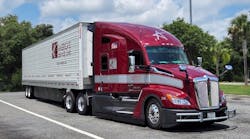The National Labor Relations Board (NLRB) of the First Region has decided that full-time, part-time and swing drivers at two Wilmington, MA, FedEx Home Delivery locations are direct employees under the company’s business model and have the right to seek union representation, according to the International Brotherhood of Teamsters.
Rosemary Pye, Regional Director of NLRB who issued the decision, said, “FedEx Home exercises sufficient control over the driver’s working conditions to warrant a finding that they are employees of FedEx Home.”
In an emailed statement to FleetOwner, FedEx Ground said:
“This regional decision is not surprising or inconsistent with a previous decision by the same NLRB Regional Director, which is currently being challenged. The decision will allow a few FedEx Home Delivery contractors and drivers in two facilities to vote on third-party representation, and ultimately may be appealed to the national board. Our contractors have shown us repeatedly that they do not want third-party representation as we currently have no unionized facilities at FedEx Ground.”
FedEx Home Delivery is a separate operating division of FedEx Ground Package System Inc. FedEx Home Delivery is challenging Pye’s earlier March 23, 2006 decision that FedEx drivers at its Worcester terminal in Northboro, MA were statutory employees.
Jim Hoffa, general president of Teamsters, noted that the ruling is the seventh time since 1988 that NLRB has found drivers at FedEx Home Delivery are direct employees, rather than independent operators.
Teamsters Local 25 in Boston will begin the process for scheduling an election under the NLRA guidelines.
“These rulings are exposing FedEx’s underhanded business model, designed to deny thousands of hardworking employees benefits they deserve as direct employees,” Hoffa said.
In the recent NLRB decision, Pye noted that under an operating agreement provided by FedEx Home Delivery, contractors may negotiate routes and one aspect of their compensation. But generally, the operating agreement is presented as a take-it-or-leave-it basis to all contractors, Pye said.
Arguing in favor of employee status, FedEx Home contractors are obligated under the operating agreement to:
- provide service that meets FedEx Home’s nationwide standard
- wear a FedEx uniform
- operate FedEx-approved vehicles that are “clean and presentable,” have a backing camera, have shelves running down both sides to comply with DOT safe loading standards and a FedEx Home logo
- be compensated under a unilateral rate that FedEx Home establishes for all contractors, with the exception of the right to appeal changes in core zone density payments
However the, FedEx Home contractors agreement also specifies that they:
- have agreed to provide services “strictly as an independent contractor, and not as an employee.”
- own and maintain their vehicles and are responsible for operating expenses
- are free to put their own name on their vehicles and may use their vehicle for other commercial purposes if they remove or cover the FedEx home logo
- may hire helpers and other drivers and determine their wages.
- determine when to start and end their day and when to take breaks and are free to determine what route to take to each stop
- receive no fringe benefits and FedEx Home does not withhold taxes from their pay
- are not subject to discipline and may challenge their termination through binding arbitration.
-
To comment on this article, write to Terrence Nguyen at [email protected]




